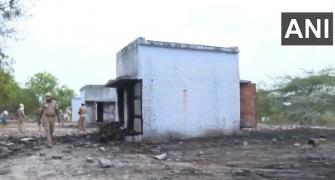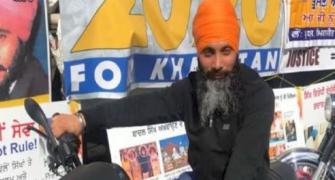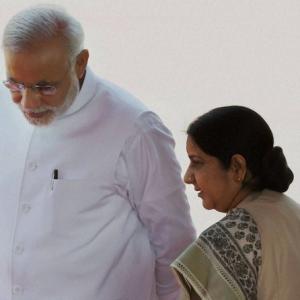 Tripura should be taken as a case study on how misuse of the AFSPA can be avoided even while transforming public opinion and controlling insurgency, says Sanjib Deb.
Tripura should be taken as a case study on how misuse of the AFSPA can be avoided even while transforming public opinion and controlling insurgency, says Sanjib Deb.
The Tripura Left Front government’s decision to withdraw the Armed Forces Special Power Act-1958 that was in force in the state for the last 18 years seems to be well timed, as the nation’s mood against this ‘draconian’ law was running high and expectedly drew a lot of appreciation from all across the country, cutting across the political dispensations, NGOs and human rights organisations.
'My plea to repeal AFSPA heard in Tripura. Victory for sanity and humanity,' senior Congress leader and former Union home minister P Chidambaram wrote on the micro-blogging site Twitter. Though the act was formulated by the government run by his party 57 years ago, he said, “Some things do not have a place in civilised country. One of them is AFPSA”.
Many others also don’t remain far behind in hailing the decision. Sitaram Yeachury, general secretary of the Communist Party of India-Marxist and the CPI leader D Raja also appreciated the Left Front government’s decision and congratulated Chief Minister Manik Sarkar for the bold decision. Citing instances of the use and abuses of the law, Raja said the Centre should review the situation and ensure that AFPSA is repealed.
The moderate faction of the separatist Hurriyat Conference led by Mirwaiz Umer Farooq also hailed the bold decision and said withdrawal of the ‘draconian law’ from Tripura should serve as an ‘eye-opener ‘for the ruling class in Jammu and Kashmir'.
Similar positive reaction came from a lot of NGOs and human rights organisations, including the Save Sharmila campaign, the movement named after Irom Sharmila Chanu who is undergoing a hunger strike for more than 12 years in Manipur demanding the withdrawal of the ‘draconian act’.
But the question being raised is, if the Left Front government of Tripura, on whom all praise was showered, considers that the AFSPA is a ‘draconian’ law. At least Chief Minister Sarkar, while announcing his cabinet’s decision, never said so. Rather, he expressed his deep confidence about the law, adding, ‘If the situation demands we will consider re-imposition of the act’.
Subsequently, in an interview with a Delhi-based English newspaper also he refrained from commenting on the law or even suggesting its withdrawal from Jammu and Kashmir. He said, “Well, border terrorism is a major problem confronting J&K. This decision has to be taken by the Union government in consultation with the state government. It wouldn’t be right on my part to suggest steps.”
Against this backdrop, does it not appear that the praise showered on Sarkar and his government for withdrawing the ‘draconian law’ was misplaced?
A cursory look at the history of the act’s use in Tripura would clearly reveal how the Left Front government’s views on AFSPA have changed over time. The act was imposed in the state thrice and every time the Left Front was in the power. It was first imposed unilaterally by the Centre in 1979 in certain areas of north Tripura, though there was no insurgency in the state at that time.
The act was promulgated to prevent Mizo insurgents take shelter there. The then chief minister, Nripen Chakraborty, toeing his party line, vehemently opposed it but refrained from pursuing it as it helped in improving the law and order situation in the area.
The second time, the law was enforced throughout the state by the then prime minister Rajiv Gandhi only three days before the state assembly elections in 1988 and it had a great impact over the outcome. The Left Front government was voted out to pave the way for the Congress-Tripura Upajati Juba Samity coalition government. The Left Front and the CPI-M accused Gandhi of misusing the act for political purposes and it got acceptability to some extent.
In the first two instances it was a unilateral decision by the Centre but the third time it was the Left Front government led by then chief minister Dasarath Deb that decided to shift from its ideological stand and proposed to impose the act in 1997 when insurgency was picking up in the state. Apart from AFSPA, the government also decided to remove the ‘draconian’ tag from another law, the National Security Act, which too they were opposing all along.
Sarkar took up the mantle of the government after one year and found no reason to go back from the decisions taken by his predecessor. Rather, his government reviewed the situation every six months and continued with both the acts for 18 years. He remained unperturbed despite national and international reactions over protests by Manipuri women and the continued hunger agitation by Irom Sharmila.
The correctness of the decision can’t be questioned, as admittedly the AFSPA played a vital role in containing the insurgency in Tripura. Since 2007 or 2008, the state is virtually free from the menace of insurgency but the state government continued with AFSPA protection as it did not want to take any risks. Now the Left Front government has decided to withdraw AFSPA not because it is a draconian act. Instead, the decision was taken paying high regard to the services the act has rendered to ensure the safety and security of the people of the state.
In view of this, Chidambaram, Yechury, Raja, Umer Farooq and many others may reconsider their stand and statements congratulating the Left Front government for withdrawal of the ‘draconian’ law. Everybody is to remember that the AFSPA is not a normal law. It is an abnormal law to combat abnormal situations.
Allegations of misuse are there, but similar allegations are not very rare in case of other normal laws like the Criminal Procedure Code or the Indian Penal Code. In the circumstances, human right organisations also may reconsider their stand. Tripura may be taken as a case study on how the act can be wielded while avoiding misuse and at the same time in transforming opinion.










